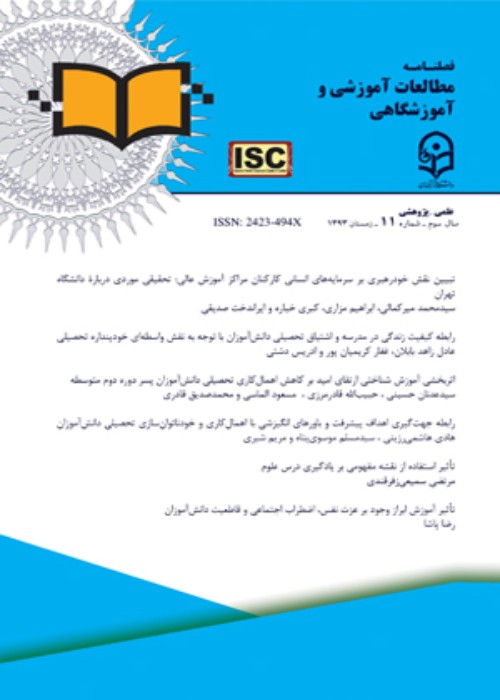Comparative Study of Education Curriculum's Work and Technology in Primary Education System of Iran and Finland and Singapore
Author(s):
Article Type:
Research/Original Article (دارای رتبه معتبر)
Abstract:
The purpose of this study is a comparative study of work and technology education curriculum in the primary education system of Iran, Finland and Singapore. The method of this research is qualitative using a comparative method based on comparative analysis. The field of research includes scientific information, documents about work and technology education in the primary education system of the world. For sampling, the method of targeted sampling was used. According to the successes of Finland and Singapore in the field of labor and technology education, these two countries were selected as a sample and compared and compared with Iran. The method of collecting documentary information is by filing method. In order to analyze the data, George Brady's four-step method has been used. The results showed that the similarities are: in terms of status, in the compulsory program at lower levels of education (elementary course); In terms of logic and reasoning, in preparing students for their future careers and careers; In terms of purpose, in introducing them to jobs, preparing them to learn professions and jobs; In terms of content and educational materials are generally consistent; In terms of teaching methods, in using active, participatory and team teaching methods, practical project, problem solving; In terms of evaluation, in the evaluation by the working method of the research folder, evaluation of the practical self-assessment project, oral-written questions; In terms of the role of the instructor, in the role of the instructor as a guide and management of class activities; In terms of the role of the learner, they are similar to the role of the learner as a questioner and the connection and synergy between what is new and what has been learned in the past and how to apply what has been learned in the real world. However, the differences are: in terms of position, in the degree of diversity and scope of the curriculum, work and technology, and the degree of integration of this program with the programs of other courses; In terms of logic and reasoning, the extent to which everyone's work, education and life are related to technology; In terms of purpose, in the amount of attention paid to the development of problem-solving skills, environmental, critical thinking, learning technological literacy; In terms of content and teaching materials, in the field of diversity in educational content and the degree of emphasis on the concepts and principles of work and technology, in terms of teaching methods, in using teaching methods based on maximum student freedom of action, semantics in teaching, Communication teaching method; In terms of evaluation, in the certification of skills and evaluation by teachers and students; In terms of the role of the educator, in the role of the teacher as a member of the family, to make the educational content meaningful for the students by adapting the content to the real world; In terms of the role of the student, there is a difference in the degree of students' freedom of action in activities, restricting education and activities to the classroom.
Keywords:
Language:
Persian
Published:
Journal of Educational and Scholastic Studies, Volume:12 Issue: 35, 2023
Pages:
525 to 558
magiran.com/p2658490
دانلود و مطالعه متن این مقاله با یکی از روشهای زیر امکان پذیر است:
اشتراک شخصی
با عضویت و پرداخت آنلاین حق اشتراک یکساله به مبلغ 1,390,000ريال میتوانید 70 عنوان مطلب دانلود کنید!
اشتراک سازمانی
به کتابخانه دانشگاه یا محل کار خود پیشنهاد کنید تا اشتراک سازمانی این پایگاه را برای دسترسی نامحدود همه کاربران به متن مطالب تهیه نمایند!
توجه!
- حق عضویت دریافتی صرف حمایت از نشریات عضو و نگهداری، تکمیل و توسعه مگیران میشود.
- پرداخت حق اشتراک و دانلود مقالات اجازه بازنشر آن در سایر رسانههای چاپی و دیجیتال را به کاربر نمیدهد.
In order to view content subscription is required
Personal subscription
Subscribe magiran.com for 70 € euros via PayPal and download 70 articles during a year.
Organization subscription
Please contact us to subscribe your university or library for unlimited access!


